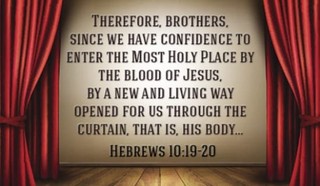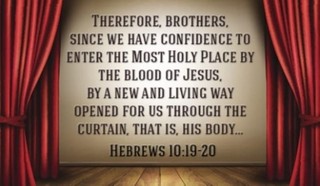
Change Translation
- Recent Translations
- All Translations
Images for Hebreos 10


Share

Share

Share
Hebreos 10 Commentary
Chapter 10
The insufficiency of sacrifices for taking away sin, The necessity and power of the sacrifice of Christ for that purpose. (1-18) An argument for holy boldness in the believer's access to God through Jesus Christ, And for steadfastness in faith, and mutual love and duty. (19-25) The danger of apostacy. (26-31) The sufferings of believers, and encouragement to maintain their holy profession. (32-39)
Verses 1-10 The apostle having shown that the tabernacle, and ordinances of the covenant of Sinai, were only emblems and types of the gospel, concludes that the sacrifices the high priests offered continually, could not make the worshippers perfect, with respect to pardon, and the purifying of their consciences. But when "God manifested in the flesh," became the sacrifice, and his death upon the accursed tree the ransom, then the Sufferer being of infinite worth, his free-will sufferings were of infinite value. The atoning sacrifice must be one capable of consenting, and must of his own will place himself in the sinner's stead: Christ did so. The fountain of all that Christ has done for his people, is the sovereign will and grace of God. The righteousness brought in, and the sacrifice once offered by Christ, are of eternal power, and his salvation shall never be done away. They are of power to make all the comers thereunto perfect; they derive from the atoning blood, strength and motives for obedience, and inward comfort.
Verses 11-18 Under the new covenant, or gospel dispensation, full and final pardon is to be had. This makes a vast difference between the new covenant and the old one. Under the old, sacrifices must be often repeated, and after all, only pardon as to this world was to be obtained by them. Under the new, one Sacrifice is enough to procure for all nations and ages, spiritual pardon, or being freed from punishment in the world to come. Well might this be called a new covenant. Let none suppose that human inventions can avail those who put them in the place of the sacrifice of the Son of God. What then remains, but that we seek an interest in this Sacrifice by faith; and the seal of it to our souls, by the sanctification of the Spirit unto obedience? So that by the law being written in our hearts, we may know that we are justified, and that God will no more remember our sins.
Verses 19-25 The apostle having closed the first part of the epistle, the doctrine is applied to practical purposes. As believers had an open way to the presence of God, it became them to use this privilege. The way and means by which Christians enjoy such privileges, is by the blood of Jesus, by the merit of that blood which he offered up as an atoning sacrifice. The agreement of infinite holiness with pardoning mercy, was not clearly understood till the human nature of Christ, the Son of God, was wounded and bruised for our sins. Our way to heaven is by a crucified Saviour; his death is to us the way of life, and to those who believe this, he will be precious. They must draw near to God; it would be contempt of Christ, still to keep at a distance. Their bodies were to be washed with pure water, alluding to the cleansings directed under the law: thus the use of water in baptism, was to remind Christians that their conduct should be pure and holy. While they derived comfort and grace from their reconciled Father to their own souls, they would adorn the doctrine of God their Saviour in all things. Believers are to consider how they can be of service to each other, especially stirring up each other to the more vigorous and abundant exercise of love, and the practice of good works. The communion of saints is a great help and privilege, and a means of stedfastness and perseverance. We should observe the coming of times of trial, and be thereby quickened to greater diligence. There is a trying day coming on all men, the day of our death.
Verses 26-31 The exhortations against apostacy and to perseverance, are urged by many strong reasons. The sin here mentioned is a total and final falling away, when men, with a full and fixed will and resolution, despise and reject Christ, the only Saviour; despise and resist the Spirit, the only Sanctifier; and despise and renounce the gospel, the only way of salvation, and the words of eternal life. Of this destruction God gives some notorious sinners, while on earth, a fearful foreboding in their consciences, with despair of being able to endure or to escape it. But what punishment can be sorer than to die without mercy? We answer, to die by mercy, by the mercy and grace which they have despised. How dreadful is the case, when not only the justice of God, but his abused grace and mercy call for vengeance! All this does not in the least mean that any souls who sorrow for sin will be shut out from mercy, or that any will be refused the benefit of Christ's sacrifice, who are willing to accept these blessings. Him that cometh unto Christ, he will in no wise cast out.
Verses 32-39 Many and various afflictions united against the early Christians, and they had a great conflict. The Christian spirit is not a selfish spirit; it puts us upon pitying others, visiting them, helping them, and pleading for them. All things here are but shadows. The happiness of the saints in heaven will last for ever; enemies can never take it away as earthly goods. This will make rich amends for all we may lose and suffer here. The greatest part of the saints' happiness, as yet, is in promise. It is a trial of the patience of Christians, to be content to live after their work is done, and to stay for their reward till God's time to give it is come. He will soon come to them at death, to end all their sufferings, and to give them a crown of life. The Christian's present conflict may be sharp, but will be soon over. God never is pleased with the formal profession and outward duties and services of such as do not persevere; but he beholds them with great displeasure. And those who have been kept faithful in great trails for the time past, have reason to hope for the same grace to help them still to live by faith, till they receive the end of their faith and patience, even the salvation of their souls. Living by faith, and dying in faith, our souls are safe for ever.
Hebreos 10 Commentaries
Chapter Summary
INTRODUCTION TO HEBREWS 10
In this chapter the apostle pursues his argument, showing the weakness and imperfection of the Levitical priesthood, and the superior excellency of Christ's, which he closes with suitable exhortations to faith on Christ, as the alone high priest, and to a constant profession of him. The imperfection of the Levitical priesthood is proved, from the law by which it was established, being only a shadow of good things to come; from the insufficiency of annual sacrifices to perfect the comers to them, or to purge the consciences of the worshippers from sin; and from the non-cessation of these sacrifices which would have been, if the above ends could have been answered by them, Heb 10:1,2, but on the contrary, by the annual return of these sacrifices, sins are afresh remembered, and very good reason there is for it, since it is an impossible thing that the blood of slain beasts should take away sin, Heb 10:3,4 moreover, the apostle proves the insufficiency of such sacrifices, by a divine testimony, out of Ps 40:6-8 by which it appears, that they are not agreeable to the will of God, and are rejected by him as useless, Heb 10:5-8 and this leads the apostle to discourse of the excellency of Christ's sacrifice above them; that they are taken away, and his is substituted in their room; that as they are not agreeable to the will of God, his is a fulfilment of it; that though they could not expiate sin, yet by the offering up of the body of Christ, once for all, his people are sanctified, or their sins are expiated, Heb 10:9,10 and this is further illustrated by a comparison between the priests under the law, and Christ; they were many, he but one; they daily offered the same sacrifices, he offered but one sacrifice; theirs could not take away sin, by his offering he has perfectly expiated the sins of his people; they stood daily ministering, their work being never at an end; he is set down at the right hand of God, expecting his enemies to be made his footstool, having done his work to perfection, Heb 10:11-14 and that legal sacrifices are ceased, and no more to be used, is proved by a testimony of the Holy Ghost, out of Jer 31:33,34 relating to the covenant of grace, among the promises of which stands that of the forgiveness of sin; from whence the apostle justly concludes, that where remission of sin is, there is, and there needs no more offering for it, Heb 10:15-18 and from hence, the apostle passes to exhortations to the exercise of grace, and discharge of duty, which he strongly urges from the consideration of Christ's priesthood, and the efficacy of it: and first, he presses them to the duty of prayer, to draw nigh to God to the throne of his grace. The manner in which he would have them approach to God, is in the sincerity of their hearts, in a plerophory of faith, an high and full exercise of it, and impurity of soul and body: the motives or encouragements to it are taken from their having boldness and liberty to enter by faith into heaven itself with their prayers, through the blood of Jesus; from there being a new and living way opened for them through, the flesh of Christ; and from their having such an high priest over the house of God as he is, Heb 10:19-22, and next he exhorts them to a constant and steadfast profession of their faith, to which he animates them by the faithfulness of a promising God, who will never leave nor forsake his people, Heb 10:23 and then to consider one another in their church relation, and to stir up one another to the exercise of the grace of love, and to the performance of good works, Heb 10:24, and also not to forsake their public assemblies, as was the custom of some, but to exhort each other to greater diligence in attending there, especially since they might observe that a time of great tribulation was at hand, Heb 10:25 and in order to deter from apostasy, which is expressed by a sinning wilfully, after a man has received and professed the knowledge of the truth, the apostle observes that the destruction of such is inevitable; since there never will be another propitiatory sacrifice offered up, and therefore there can be no other than a dreadful expectation of an awful judgment, and of the wrath of God, which, like a consuming fire, will destroy such adversaries of Christ, Heb 10:26,27 the justice of which is argued from the less to the greater; that if the transgressors of the law of Moses had no mercy shown them, but died when there were proper and sufficient witnesses of their crimes, then such must be deserving of a far greater punishment, who treat with the greatest rudeness the person of the Son of God, and his precious blood, and with the greatest contempt the person and grace of the Holy Spirit, Heb 10:28,29, and such persons have reason to expect the vengeance of God will fall on them, since it is threatened them in the word of God, De 32:35,36 and a dreadful thing it is to fall into his hands, Heb 10:30,31. But in order to encourage these believing Hebrews to hold on and out unto the end, the apostle puts them in mind of their good beginning, how well they set out, and how bravely they behaved, by bearing afflictions and reproaches themselves; by being the companions of those that were afflicted and reproached; by having compassion on the apostle when in bonds; and by cheerfully suffering the loss of their goods upon this consideration, that they had in heaven a better and a more enduring substance, Heb 10:32-34 wherefore it would be exceeding wrong and very unbecoming, after all this, to drop their faith and a profession of it, which otherwise would issue in the enjoyment of the great recompense of reward, Heb 10:35 and as patience is necessary, it is right to exercise it under sufferings for Christ's sake, partly because it is doing the will of God, and partly because that after that is done, such shall receive the promised happiness; and what may serve the more to engage to the exercise of it is, it is but a little while and Christ will come and put an end to all the sufferings of his people, Heb 10:36,37 and that faith should be in exercise, is proved from a divine testimony, Hab 2:4 and so must be pleasing to God, when the contrary is highly resented by him, Heb 10:38 and now, lest the believing Hebrews should conclude from all this that the apostle suspected them as going into apostasy, he declares his belief, that he and they were not in the number of apostates, but of believers, whose souls would be saved, Heb 10:39
Título en Inglés – The Jubilee Bible
(De las Escrituras de La Reforma)
Editado por: Russell M. Stendal
Jubilee Bible 2000 – Russell Martin Stendal
© 2000, 2001, 2010
Study Tools
PLUSUnlock Notes
This feature is for PLUS subscribers only. Join PLUS today to access these tools and more.
JOIN PLUSUnlock Highlights
This feature is for PLUS subscribers only. Join PLUS today to access these tools and more.
JOIN PLUSUnlock Bookmarks
This feature is for PLUS subscribers only. Join PLUS today to access these tools and more.
JOIN PLUSTrack Your Reading
Create a free account to start a reading plan, or join PLUS to unlock our full suite of premium study tools.